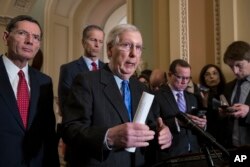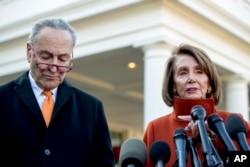Republican and Democratic Congressional leaders are huddling on Capitol Hill seeking compromise, as President Donald Trump appears to back away from his threat to force a government shutdown.
After saying last week he would be "proud" to partially close down the government over his demands for a border wall, Trump told reporters Tuesday, "We'll see what happens. It's too early to say. We need border security."
The federal government will start winding down nonessential operations Friday if Congress and the White House cannot agree on a long- or short-term spending bill.
More than 800,000 federal workers would be furloughed or work for no pay — something nobody wants to see a week before Christmas.
Trump wants $5 billion in funding for the wall along the U.S.-Mexico border, but House and Senate Democratic leaders have refused.
On Tuesday, Republican Senate Majority Leader Mitch McConnell proposed $1.6 billion for border fencing — money already agreed on in a bipartisan Homeland Security bill — and an additional $1 billion Trump could spend on the border.
McConnell called the offer "reasonable." Democratic leaders say no.
"[Senate Democratic leader Chuck] Schumer and I have said we cannot support the offer they made of a billion-dollar slush fund for the president to implement his very wrong immigration policies," House Democratic leader Nancy Pelosi said.
Meanwhile, White House spokeswoman Sarah Sanders said there were "other ways" to get the money for a southern border wall.
"There's certainly a number of different funding sources that we've identified that we can use that we can couple with the money that would be given through Congressional appropriations that would help us get to that $5 billion that the president needs in order to protect our borders."
But some Democrats reminded the White House that under the Constitution, Congress would still have to appropriate that money. Democrats will control the House in the new Congress.
Congress has already approved funding for three-fourths of the federal government until the end of September 2019. The remaining one-fourth includes funding to run the Departments of Homeland Security, State, Justice, and the Interior.







